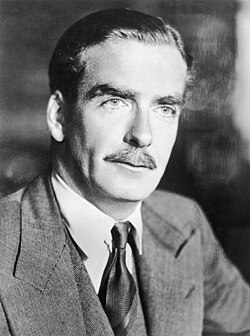Eden ministry | |
|---|---|
| Cabinet of the United Kingdom | |
| 1955–1957 | |
 | |
| Date formed | 6 April 1955 |
| Date dissolved | 9 January 1957 |
| People and organisations | |
| Monarch | Elizabeth II |
| Prime Minister | Sir Anthony Eden |
| Deputy Prime Minister | [note 1] |
| Total no. of members | 132 appointments |
| Member party | Conservative Party |
| Status in legislature | Majority |
| Opposition party | Labour Party |
| Opposition leader |
|
| History | |
| Election | 1955 general election |
| Legislature terms | |
| Predecessor | Third Churchill ministry |
| Successor | First Macmillan ministry |
In April 1955, following the resignation of Winston Churchill, Anthony Eden, then-Deputy Prime Minister and Foreign Secretary, was invited to form government as he took over as Leader of the Conservative Party.
Contents
Eden then shortly asked Queen Elizabeth II to dissolve Parliament and call a general election for 26 May. Winning a majority of 60, he then resigned the office on 10 January 1957. [1] [2]
